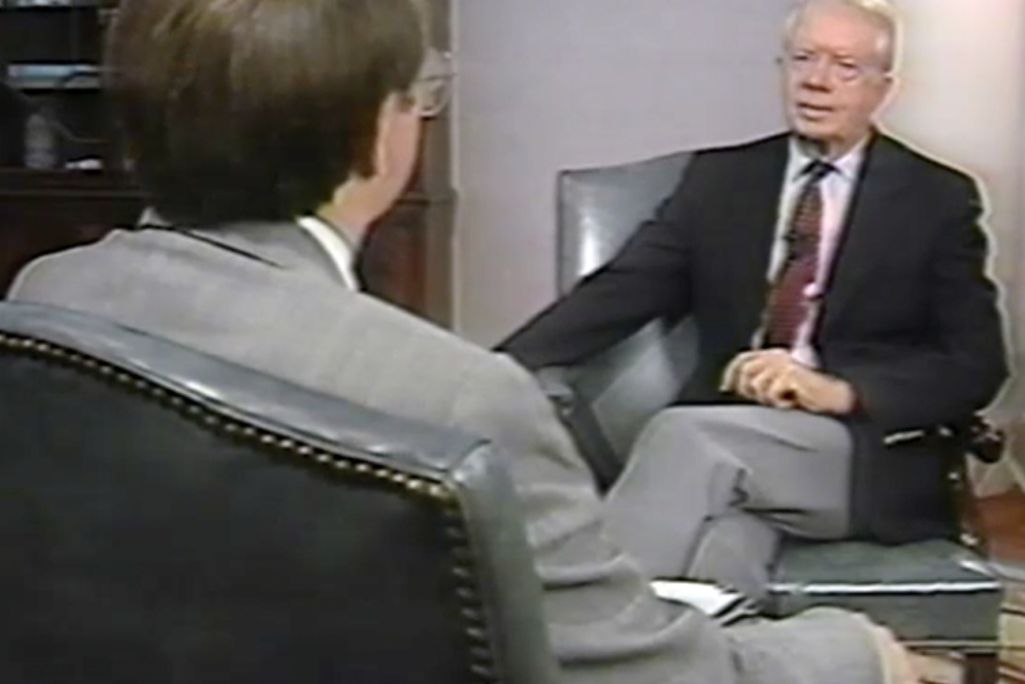
Former President Jimmy Carter was interviewed by Bill Sumners, then-director of the Southern Baptist Historical Library and Archives, in 1991.
PLAINS, Ga. (BP) — When Plains Baptist Church voted overwhelmingly in the 1950s to bar Blacks and “racial agitators” from membership, Jimmy Carter and a handful of his family members were the only ones opposed to the restriction.
Born into a church that taught white supremacy, the first Southern Baptist to serve as U.S. president had learned the truth over time, he said in two notable interviews available for reading as America lays the 39th president to rest.
Carter died on the last Sunday in 2024 at 100 years old and is being honored with a service in the Capitol Rotunda at 4:30 p.m., Eastern today (Jan. 7). His remains will lie in repose before his national funeral service on Jan. 9 at the Washington National Cathedral. A private service and burial will follow in Plains.
“I would say that my early life spent in the segregation of society and by serving the Navy when Harry Truman ordained that racial discrimination would not apply in any ship on the Navy or in any military forces,” Carter said, “I would say it was a slow and evolving process for me to become convinced that everybody’s equal in the eyes of God.”
Carter was speaking with Southern Baptist Theological Seminary President Albert Mohler on the March 26, 2012 episode of Mohler’s “Thinking in Public” podcast.
Carter, who established a legacy as an advocate for justice and equality, also discussed the roots that shaped him in a Sept. 17, 1991, interview with Bill Sumners, then Southern Baptist Historical Library and Archives (SBHLA) director and archivist, published in the January 1997 edition of Baptist History and Heritage.
“I grew up in a church and in a community that was absolutely convinced that the Bible mandated superiority of white people with the Black neighbors being inferior. And we would have people come to our church or to our Brotherhood meetings — experts on carefully selected verses from the Bible to prove that God never intended for racial discrimination to be ended — that Black people were permanently condemned to an inferior position because of the will of God,” Carter told Sumners in 1991.
“This was the way I grew up in the church, and I would say that the church was and has been the last of the bastions of racial segregation and discrimination. The political world changed — the educational world changed — faster than the church changed, and this is one of the reasons why our present church was formed,” Carter said. “It was because that difference still exists. We welcome in our church equality of all people, regardless of race, and we have Black members of our church.”
Carter’s church in 1991 and until his death was Maranatha Baptist Church in Plains, which formed during his presidency by breaking from Plains Baptist Church, Carter’s boyhood congregation. Today, Plains Baptist is a Southern Baptist congregation in good standing, professing the Baptist Faith and Message 2000 as its statement of faith.
Maranatha, no longer a Southern Baptist congregation, hired in May 2024 Ashley Guthas as its pastor, the first female to hold the post at the church.
The Southern Baptist interpretation of Scripture that limits the role of pastorate to men is one of the reasons Carter publicly withdrew from the Southern Baptist Convention (SBC) in 2000, which he addressed with Mohler.
“I played an active role in a top echelon of the Southern Baptist Convention without having an official office. I really became concerned about the basic thrust of the Southern Baptist Convention on two or three issues that happened in Florida in the convention when it was there, in particular, the status of women,” Carter said.
“I feel very strongly, in the eyes of God, women are equal to men, and to choose the particular passages that say that women have to be subservient to men and that they should not teach men and boys, I think it contrary to the basic thrust of what Christ meant and said. I know that you have a different belief in that and Southern Baptists do as well.”
Though the men disagreed, the conversation remained warm and friendly. Carter expressed his belief in “complete equality” and shared that he had participated in the ordination of the husband and wife pastoral team who served at Maranatha at that time.
“I think in Romans 16 when Paul described all the leaders of the Christian world in those days, he mentioned a number of women who held exalted positions within the early Christian church, so that’s been the main problem that I have with the Southern Baptist Convention,” Carter said. “Had it not been for that issue, I would be much more accommodating with the Southern Baptist Convention.”
With Sumners, Carter spoke of his dissatisfaction with the Southern Baptist Conservative Resurgence — a controversy that rocked the SBC the 12 or 13 years preceding the interview with Sumners. Carter described it as “one of the greatest tragedies” of his Christian life and “a totally unnecessary political struggle for control of the Southern Baptist Convention organization mechanism, budgets, seminaries and mission programs.”
The Sumners interview is available among SBHLA digital resources.
(EDITOR’S NOTE — Diana Chandler is Baptist Press’ senior writer.)


